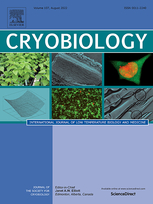
Cryopreservation of isolated human hepatocytes for transplantation: state of the art.
Author(s) : TERRY C., DHAWAN A., MITRY R. R., et al.
Type of article: Article
Summary
Hepatocytes isolated from unused donor livers are being used for transplantation in patients with acute liver failure and liver-based metabolic defects. As large numbers of hepatocytes can be prepared from a single liver and hepatocytes need to be available for emergency and repeated treatment of patients it is essential to be able to cryopreserve and store cells with good thawed cell function. This review considers the current status of cryopreservation of human hepatocytes discussing the different stages involved in the process. These include pre-treatment of cells, freezing solution, cryoprotectants and freezing and thawing protocols. There are detrimental effects of cryopreservation on hepatocyte structure and metabolic function, including cell attachment, which is important to the engraftment of transplanted cells in the liver. Cryopreserved human hepatocytes have been successfully used in clinical transplantation, with evidence of replacement of missing function. Further optimization of hepatocyte cryopreservation protocols is important for their use in hepatocyte transplantation. [Reprinted with permission from Elsevier. Copyright, 2006].
Details
- Original title: Cryopreservation of isolated human hepatocytes for transplantation: state of the art.
- Record ID : 2007-1317
- Languages: English
- Source: Cryobiology - vol. 53 - n. 2
- Publication date: 2006/10
Links
See other articles in this issue (9)
See the source
Indexing
-
Cryopreservation of hepatocytes: state of the art.
- Author(s) : AOKI T., KOIZUMI T., IZUMIDA Y., et al.
- Date : 2005/03
- Languages : English
- Source: Low Temperature Medicine - vol. 31 - n. 1
- Formats : PDF
View record
-
Liver storage and sinusoidal endothelial cell i...
- Author(s) : TAKEI Y., KAWANO S., FUSAMOTO H., KAMADA T.
- Date : 1995/07
- Languages : Japanese
- Source: Low Temperature Medicine - vol. 21 - n. 1
View record
-
Cold preservation and reperfusion injury of liv...
- Author(s) : ARII S., IMAMURA M.
- Date : 1995/07
- Languages : Japanese
- Source: Low Temperature Medicine - vol. 21 - n. 1
View record
-
Cryopreserved human haematopoietic stem cells r...
- Author(s) : SPURR E. E., WIGGINS N. E., MARSDEN K. A., et al.
- Date : 2002/06
- Languages : English
- Source: Cryobiology - vol. 44 - n. 3
View record
-
Optimising cryopreservation protocols for haema...
- Author(s) : HUNT C. J., PEGG D. E., ARMITAGE S. E.
- Date : 2006/03
- Languages : English
- Source: CryoLetters - vol. 27 - n. 2
View record
